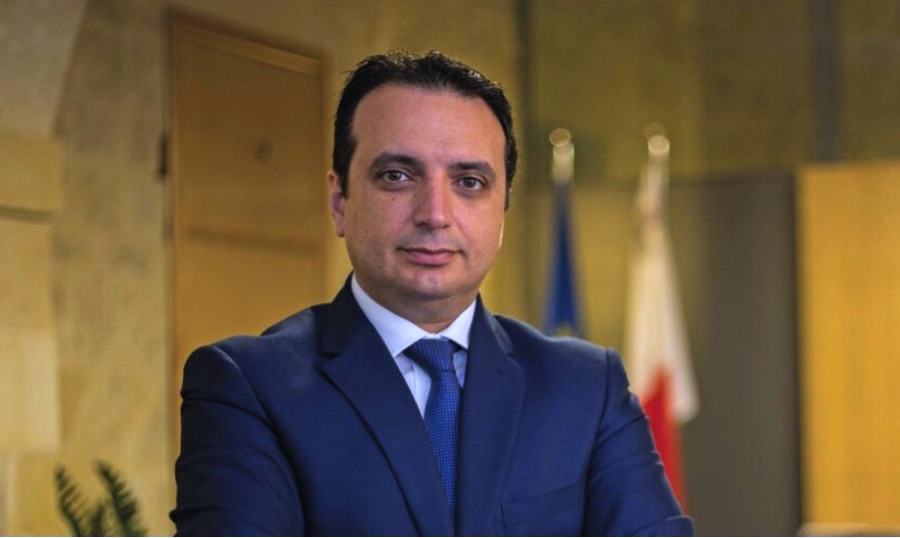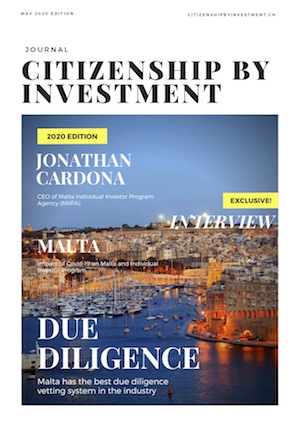Read our exclusive interview with Mr. Jonathan Cardona, CEO of Malta Individual Investor Program Agency. Mr. Cardona explains the impact of Covid-19 and the importance of due diligence with Individual Investor Program.
Quick summary
- Malta has the best due diligence system in the world and does not have the philosophy of cutting corners when it comes to due diligence.
- The Individual Investor Programme (IIP) has attracted about €1.4 billion euros into the economy of Malta. Several applicants also opened a commercial operation on the islands, adding to the value generated.
- Malta will not be able to organize due diligence conference this year, postponed to next year, due to current situation.
- Covid-19 did have an impact, but Malta has healthy pipeline of applications.
- IIP Applicants had to apply for schengen visa, vetted through the VIS or SIS systems, where other countries have window of opportunities to look into the subjects.
- Malta is planning some regulatory changes that provide more flexibility with timelines and deadlines for providing documentation, but wont compromise on high standards.
Below is the full interview and in-depth understanding into due diligence of Malta on applicants for Individual investor program..
1. What is the impact of Coronavirus on Individual investor program?
The COVID-19 crisis has had an obvious effect on citizenship and residence by investment programmes. These are migration programmes and, with the closure of both air and sea ports, individuals cannot travel. But we do have a healthy pipeline of applications, entered before the shutdown.
2. Are you considering any changes to the IIP considering the current global pandemic?
We are planning some regulatory changes to provide more flexibility with timelines and deadlines for providing documentation, but we won’t compromise on high standards. Malta does not have the philosophy of cutting corners and that still applies during this period.
3. How much is IIP contributing to Malta’s GDP annually?
Since its inception in 2014, the Individual Investor Programme (IIP) has attracted about 1.4 billion euros into the economy of Malta. This includes the statuary contribution, purchase of bonds, purchase or lease of property and donations to local voluntary organisations. Several applicants also opened a commercial operation on the islands, adding to the value generated.
4. How is Government using the revenues generated from IIP?
Most revenue generated by the IIP is put aside for strategic investment in the National Development and Social Fund, and this has acted as collateral for soft loans for local businesses. Recently, the Government decided to change the ratios of how funds are distributed and now 80% are directed to the consolidated fund, giving the Government more flexibly to help the economic sector to save jobs, and the health sector to save lives. Malta is considered to be one of the best European countries in the way it has dealt with COVID-19 (https://lovinmalta.com/news/malta-comes-in-as-top-eu-country-and-fifth-best-worldwide-in-ability-to-withstand-covid-19-fallout/) and this is due, in part, to the revenue available from the IIP.
5. How are applicants vetted for IIP scheme? Are they subjected to Enhanced Due diligence checks? Please explain in detail the EDD process
With regards to vetting of applications, we have a strict approach. We are selective so as to maintain high quality. Processes have evolved during the past six years. Today we have arguably one of the best due diligence systems in the industry; this is thanks to a great effort by our specialist team, working in conjunction with law enforcement agencies and due diligence providers.
It is important to note that applications go through several processes. Firstly, the applicant has to apply for a visa, where applicable, to come to Malta. Therefore, their details are vetted through the VIS or SIS systems whereby other countries have a window of opportunity to object. They also have to apply for a residence card, the process of which involves a law enforcement check, including vetting against databases of international police agencies. The individuals also have to come to Malta multiple times during the process, which in itself is another layer of checking, due to border controls.
Once the application reaches our agency, our due diligence team start vetting it to ensure that all the documents required to perform a thorough due diligence are there, that they are properly translated, authenticated and so on. If key information is missing, the application is put on hold until these documents are received in the proper format.
When everything is in order, the application is given to two due diligence service providers so that they can perform their deep analysis, including boots on the ground checks and cross referencing. We use such providers as they have the necessary knowledge of many regions of the world. They take into account different cultures, different ways of doing business, family ties, and language and dialect variations. When the reports are received by our officers, we conduct a thorough open source due diligence, combing through all the information gathered so far. Our team questions applicants where gaps are identified, or where clarifications are needed. In today’s world, one of the major challenges is sifting between fact and fiction, and whilst we have to be strict, we also have to be fair with the families who apply.
Every application is scrutinised in the following seven categories:
Identification and verification
Identification and verification is the first category of the risk matrix and looks at how the identity of applicants has been established and verified, while considering all the countries they have resided in over the ten years preceding the application.
Business and Corporate Affiliations
The second category looks at an Applicant’s business and corporate affiliations and takes into consideration ties with offshore activity, jurisdictions and industries.
Politically Exposed Persons
A category in itself is where applicants are politically exposed persons and are, or have been, on sanctions or watch lists.
Wealth
The fourth category of the risk matrix, constituting the most significant focus of the due diligence process, establishes how the family have accumulated their wealth, and from where the funds for financing the application originate. The risk assessment under this category has an even stronger focus on documented evidence, at times delving into extremely granular detail, such as bank statements, articles of association, share registers and certificates of incorporation, certified copies of contracts and transactions. Tax evasion risks are also taken into consideration.
Reputation
The applicants’ reputation constitutes the fifth category of the risk assessment matrix, taking into consideration the overall reputation observed through OSINT, reports and on-the-ground intelligence.
Legal and Regulatory Matters
The sixth category focuses on legal and regulatory matters with incremental risk factors based on any charges or convictions for criminal or civil offences, including fines at an incremental interval.
Relative Impact on the MA’s Immediate Network
The six categories of risk mentioned so far are commonly analysed within the financial sector. However, the seventh category is somewhat bespoke to the industry of CBI and consists of an analysis of the MA’s activities and the relative impact on the MA’s immediate network and society in general. This is to ensure that no stone is left unturned and to enable the team to cover any incidental area, which is deemed essential and was not covered by any of the other previous categories.
When the due diligence officer reviews all the data and prepares the report with the finding on the application, it is first peer reviewed internally, to ensure a standardised approach with knowledge and experience shared between the whole team, and thereafter it is reviewed again at a senior level within the agency.
The case is then presented to the minister for his review and final decision.
6. Why is the refusal rate for IIP applicants so high?. The annual reports seem to indicate 25-30% refused every year.
Since we look at all these elements, we have a relatively high rejection rate and, often, the main cause is lack of clarity on the source of wealth and funds, an issue which we take seriously.
7. What steps the Maltese government has taken to protect the IIPA staff from Covid-19?
Most of our team are working on a rotation basis, between office and home. Targets are still being met and work has flowed normally without any major issues, apart from having to follow standard practices, as directed by the Department of Health.
8. What will happen to the due diligence conference this year 2020?
We have organised two due diligence events so far. This year, due to the current situation, we are not able to organise such an event, but hope we will be able to do so next year.
9. Does IIPA have powers to revoke passports under the scheme?
Due diligence is an ever-evolving subject. There are EU directives on AML/CFT which we take into consideration and, from experience, we identify how some individuals try to dodge the systems and adapt accordingly.
With regards to the deprivation of citizenship, when the Agency becomes aware of a possible fraudulent application, or of an individual who has become a serious liability to the country of Malta, the Agency gives an informed opinion to the Minister responsible for citizenship and a procedure to deprive citizenship is initiated by the Department of Citizenship. So far, there have been four cases where such a procedure has been initiated. One has been concluded with citizenship deprived, and the remaining three are currently in process.
The official website of the MIIP Agency is available at iip.gov.mt
The Interview is available for free download with our new magazine cover. Download here
This is a free digital copy. Please feel free to share, copy or distribute wherever you want. No permission is required from us.
Editor’s Note: We thank the MIIPA for the interview during these difficult times in answering these important questions that gives great insight into working of IIP. We wish MIIPA and staff to stay safe.







